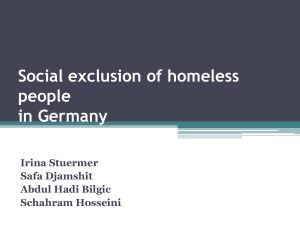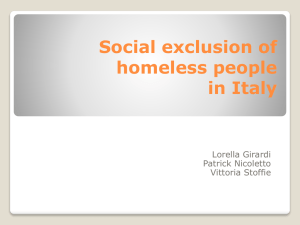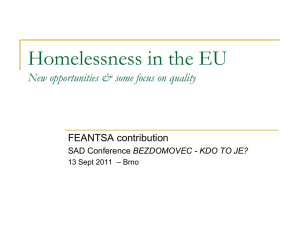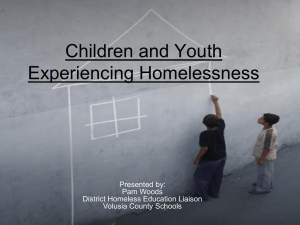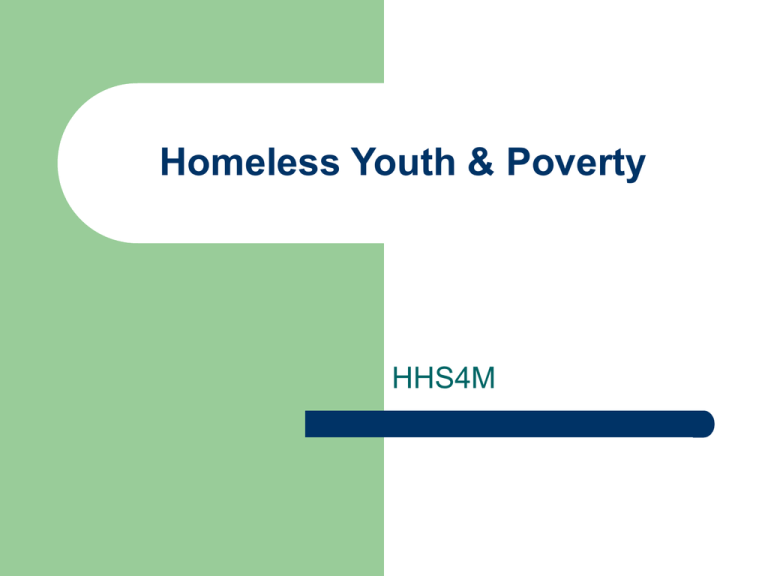
Homeless Youth & Poverty
HHS4M
What does it mean to be homeless?
Homeless includes:
people staying in motels until their money
runs out
those staying with friends
those staying in shelters
those sleeping outside or in whatever
space to protect them from the weather
According to Wikipedia…
Homelessness is the condition and social category of
people who lack housing, because they cannot afford, or
are otherwise unable to maintain, regular, safe, and
adequate shelter. The term "homelessness" may also
include people whose primary nighttime residence is in a
homeless shelter, in an institution that provides a
temporary residence for individuals intended to be
institutionalized, or in a public or private place not
designed for use as a regular sleeping accommodation for
human beings. A small number of people choose to be
homeless nomads, such as some Romani people (Gypsies)
and members of some subcultures. An estimated 100
million people worldwide are homeless.
Increasing Problem?
Always been homeless people, but the
number has been growing in industrial
nations
Some call it a national disaster
–
–
–
Hard to determine the number
Toronto – 26 000 people use shelters daily –
increasing yearly
Montreal – 4000 to 5000 homeless youth
Halifax – 100 homeless youth
Causes of Homelessness
Disruptive Family Conditions
Living on the street is a better alternative
Physical, psychological, or sexual abuse lead to neglect or
abandonment
75% of street youth report being victims of abuse
Custody issues leave children without parents
Leave to escape parental rules
I would rather be homeless," one street teen said. "It is
cold and miserable on the streets, but it is better than
being beaten up by parents who don't care."
Causes of Homelessness
Residential Instability
20% of homeless youth come from foster care
50 000 young Canadians run away for home each year
90% return home within 60 days, but most of the remaining
10% remain homeless
“Many foster children have had difficulty making the
transition to independent living. Several are homeless,
become single parents, commit crimes, or live in poverty.
They are also frequent targets of crime.”
Charles Foster Bass
Causes of Homelessnesss
Leave Home Unsuccessfully
Leave home to work and live independently but become
homeless when they are unable to move back home
Typically suffer from financial crisis
Returning home is not a realistic option
“What difference does it make to the dead, the orphans,
and the homeless, whether the mad destruction is wrought
under the name of totalitarianism or the holy name of
liberty or democracy?”
Mohandas Gandhi
Challenges of Homeless Youth
Daily Changes:
Unable to plan for a productive life
No structure
Depend on begging or illegal means of income to meet basic
needs
Poor health – infections, malnutrition & STD’s
Addictions – est. 40% use intravenous drugs (sometimes support
by working in the sex trade, could lead to HIV)
Psychological disorders
Street youth have a mortality rate 13 times higher than other
youth
Attracted to temporarily (often harmful) solutions to large
problems
Poor education, poor job opportunities, poor self-esteem, poor
identity, poor self-worth, poor judgment – all equal an
unsuccessful transition to adulthood
Problem of Homelessness
Long term solution is most challenging as there is no
consensus as to why it is increasing
Functionalists – might state that drugs are increasing,
alcohol is increasing, youth choose this life to avoid
conforming to their parents
Conflict Theory – decline in stable employment reducing
income and rising affordable housing. Illustrates a growing
gap between the rich & the poor. Short term solution relies
on governmental & non-profit organizations to alleviate
immediate needs of the homeless, especially for youth so
that they can become self-reliant
http://intraspec.ca/guide2008.pdf






